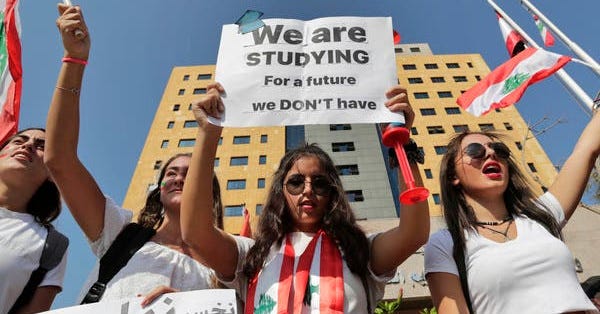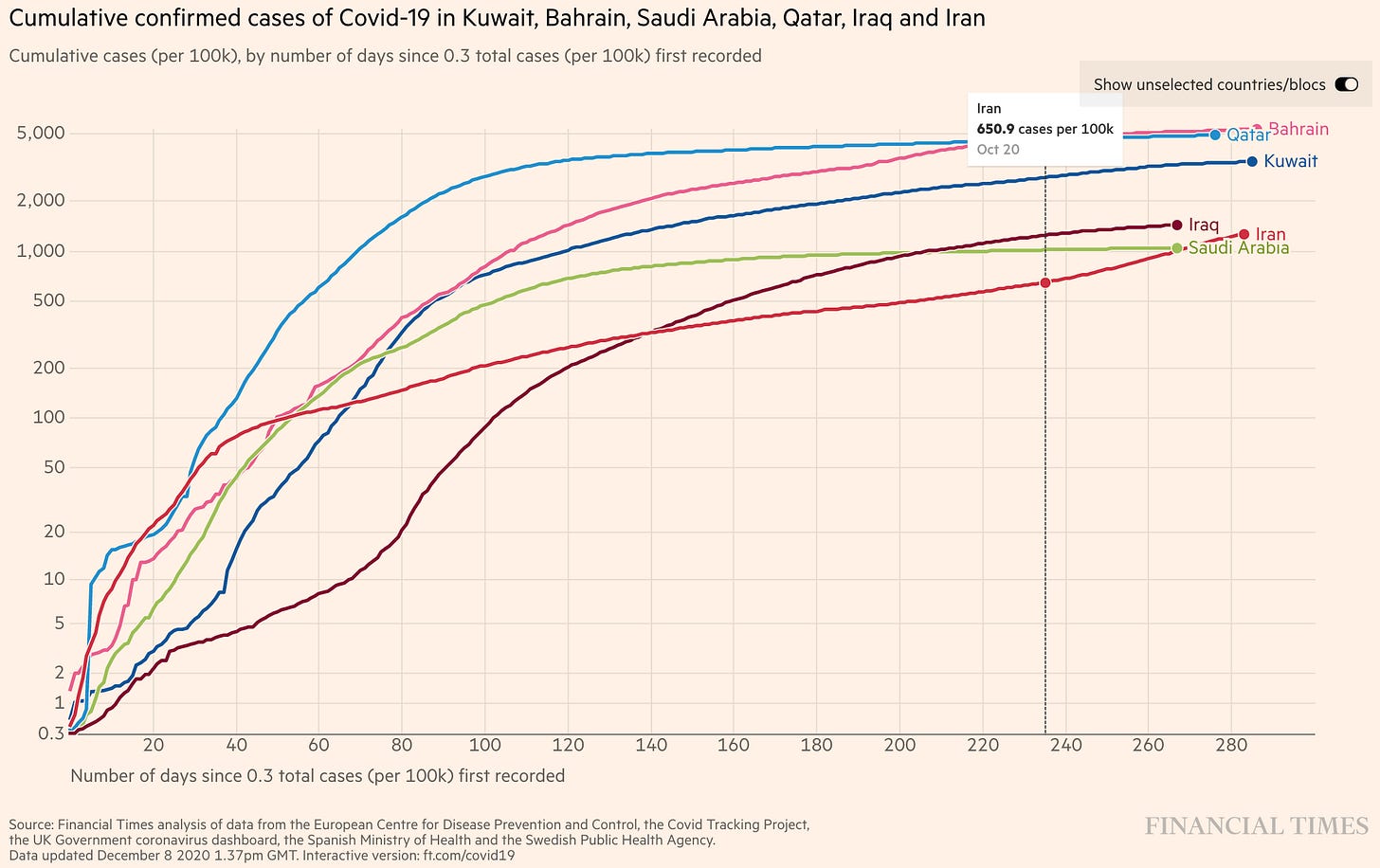🌍 Inside The Middle East — Dec. 9
Iran Journalist Death Sentence, U.A.E Sheikh Buys Israeli Football Team, Israel Fourth Election, Lebanese Uni Hikes Tuition 160%, Kuwait Election, Bahrain Approves Another Vaccine
Hello folks! Happy Wednesday and welcome to Inside The Middle East where we dissect the week's most important news from the world's most important region.
This week we’ll zip around several countries including Iran whose Supreme Court upheld a decision to sentence a prominent journalist to death; Israel where a member of the U.A.E.’s royal family purchased a 50 percent stake in a notoriously racist Israel football team, plus Israel’s parliament has set the stage for a fourth election in less than two years; Lebanon whose top university has hiked tuition fees by more than double; Kuwait who held a general election over the weekend; and Bahrain which became the second country in the world to approve Pfizer’s Covid-19 vaccine.
As ever, be sure to check out last week’s Inside The Middle East where we summarized the assassination of Iran’s top nuclear scientist; Picks of the Week where we looked at the collapse of one of the world’s largest telescopes in Puerto Rico; and our podcast with The Atlantic staff writer Olga Khazan, who shed light on what it’s like to work at one of America’s oldest news institutions, and we also dove deep into her new book Weird: The Power of Being an Outsider in an Insider World. Okay Aina, take it away…
Job Corner
We added another 151 positions to the job board taking our total full/part-time jobs, freelance gigs and internships to 1,014! New outlets include CNN, NPR, Politico, The Atlantic, The Economist and the Washington Post. Check out the links below for full access…
Preview of this week’s job board…👇
Data Corner
A couple datasets used in today’s newsletter…
Press Freedom: 2020 World Press Freedom Index rankings, from Reporters Without Borders
Vaccines: Which countries have bought which vaccines, from Duke University
Israel Headed For Fourth Election in Two Years 🇮🇱
We start this week in Israel whose parliament voted to dissolve itself in a move that will likely lead to the country’s fourth general election in less than two years. The vote in the Knesset was led by leader of the opposition Blue and White Party Benny Gantz, Prime Minister Benjamin Netanyahu’s arch political rival, and whom has served as defense minister in the Netanyahu-led coalition government since it was formed in May. The agreement between the two stipulated that Netanyahu would serve as PM for the first 18 months, after which Gantz would assume the role for the next 18 months.
But just six months into the coalition, the trust between the two men has caved. Gantz accuses Netanyahu of lying and obstructing the approval of the 2020 budget, which was at the heart of the original deal. Meanwhile Netanyahu is currently on trial for charges of bribery, fraud and breach of trust, and must stay in power to avoid possible prosecution. The reality is that the majority of Israelis don’t trust either men, according to a recent poll by the Israel Democracy Institute. Another vote is expected this week and, if passed, will trigger a spring election.
Benjamin Netanyahu (left), Benny Gantz (right) 👇
Lebanon University Hikes Tuition by More Than Double 🇱🇧
Moving south next where Lebanon’s top university has increased tuition by 160 percent. Lebanon predominantly uses the U.S. dollar as its currency, but because of the country’s woeful economic situation, a huge difference between the official exchange rate and that of the illegal market has widened. As a result, the Lebanese pound has lost close to 80 percent of its value since mid-2019. The American University of Beirut has thus switched to the unofficial rate of 3,900 Lebanese pounds to one U.S. dollar, up from the official rate of 1,500 Lebanese pounds. The decision was reportedly made in June, but was delayed in hopes that economic reforms and access to international aid would stabilize the currency.
After a tumultuous year for the Lebanese people, 250 of around 9,400 students stopped their studies before the tuition rise, and a further 600 incoming students withdrew. The university expects even more will leave in the coming weeks. Founded in 1866 and despite its ranking among the world’s top 250 universities, AUB has been swept by multiple crises, laying off 1,500 staff in July.


Last Time on Inside The Middle East…
🌍 Inside The Middle East — December 2
🌍 Inside The Middle East — November 25
🌍 Inside The Middle East — November 18
🌍 Inside The Middle East — November 11
Kuwait Election Dissection 🇰🇼
We’ll look at Kuwait’s general election next where the opposition made significant gains resulting in the government’s resignation, while the only female legislator lost her seat. Amid calls for reforms over corruption and high debt, 24 of the National Assembly’s 50 seats were won by candidates part of or linked to the opposition, boosting their seat count by half from 16 in the last parliament. But it was a disappointing night for women and diversity, who failed to get a single candidate elected despite 29 women running, the largest cohort since they were allowed to vote and run for office in 2005.
The biggest winners from this weekend’s poll included tribes, hardline Islamists, and younger people as 30 candidates under the age of 45 won their races. Turnout was around 60 percent, in a country where political parties are banned and candidates run as individuals. The new parliament will immediately need to address the state’s dismal economic outlook due to Covid-19, where for the first time oil revenues won’t be enough to cover salaries and subsidies. Among its neighboring countries, Kuwait has been one of the worst Covid performers.

Bahrain Second Country To Approve Pfizer Vaccine 🇧🇭
Staying in the Gulf next where Bahrain became the second country in the world to approve the Pfizer/BioNTech Covid-19 vaccine, after the UK did so last week. The hard work isn’t over though: The doses must be kept at -70 degrees Celsius (-94 degrees Fahrenheit) and will pose unthinkable logistical challenges in a country that rarely takes a break from its hot and humid weather. Pfizer joins the Chinese Sinopharm vaccine to be approved in the state, which has already administered doses to 6,000 health workers.
Below are some maps my colleagues and I at WSJ put together looking at where the three major vaccines developed in the West are headed…

Israeli Football Club Gets New Arab Owner 🇮🇱 🇦🇪
Moving further down the Gulf next to the U.A.E. where a member of the royal family has purchased a 50 percent stake in Beitar Jerusalem, the Israeli football team best known for its unofficial policy of not buying Muslim or Arab players. Sheikh Hamad bin Khalifa Al Nahyan will invest $92m/£68m over the next 10 years, and has said that religion will no longer be a factor in signing players. Co-owner Moshe Hogeg, an Israeli technology entrepreneur, bought the club in 2018 with the determination to kick racism out of the club.
The club’s most hardcore fans call themselves “La Familia”, and led a fan walkout in 2013 over the signing of two Chechen Muslims, Zaur Sadayev and Dzhabrail Kadiyev. Responding to the sale of their club to a Muslim owner, some fans sprayed racist graffiti on the team’s stadium. The sale comes three months after Israel and the U.A.E. agreed to normalize official relations, and after an Emirati team signed an Israeli player in September.
Beitar Jerusalem fans: 'Here we are, we're the most racist football team in the country'
Iran Court Upholds Journalist Death Sentence 🇮🇷
We end today in Iran whose Supreme Court upheld a journalist’s death sentence for his use of social media. Ruhollah Zam created a news channel called AmadNews within the encrypted messaging app Telegram, and had around 1.4 million followers when he was kidnapped in France where he had been living in exile, and arrested in June. Following the nationwide protests in 2017 and 2018, the Iranian government had all social media including Telegram banned, but Zam relaunched under a different name. He was accused of working with French and Israeli intelligence to destabilise Iran. Reporters Without Borders ranks Iran 173rd out of 180 countries, among the likes of Syria, China and North Korea.
Iran’s massive protests, explained
That’s all for today. We’ll see the members tomorrow for a full Election Dissection! 👋






